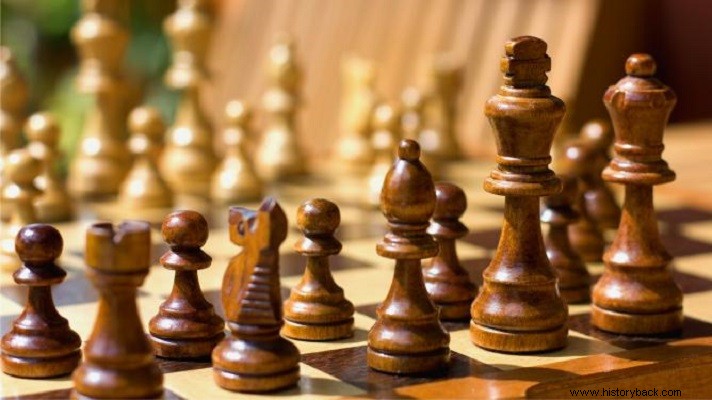
Gioacchino Greco, the chosen "Calabros" was the best chess player of his time. He played all over Europe and beat the best players in Italy, France, Spain and England. He was the first to record entire chess games. Chess is an ancient game and at the same time it is the oldest wargames. Legends connect it with the Pettia of the hero of the Mycenaean era Palamides or even with the Minoan Zatriki of the 16th century. e.g. Chess existed in various forms in Asia and Europe.
Most want it to come from India although the terms are Persian. In any case, chess as we know it today - because the moves were and are different from those known in Indian or Chinese Chess - began to spread in the 15th century. Until then, the so-called "medieval chess" dominated, where the Queen or its counterpart was not the dominant piece that it is today on the chessboard. The Spaniard de Lucena in his book of 1497 gives parts of lots with the old and the new system of movements. Among other things, he delivers the famous "Suffocation Checkmate", the absolute predominance of logic over the numerical superiority of the opponent.
Greco apparently received his name because of ancestry. It is no coincidence that it was also called "Kalavros" from the most Greek Calabria of Greater Greece. An American chess historian argued that Greco was not born in Calabria but migrated there from the Peloponnese. Little is known about his life before he became the most famous chess player of the then known world. He is said to have been born around 1600 in Italy or the Peloponnese. It is unknown at what age and by whom Chess was taught. But in 1620, at the age of just 20, he wrote his first chess manual, "Trattato Del Nobilissimo Gioco De Scacchi" (Treatise on the Noble Game of Chess).
Having prevailed against the nobles who were at that time mainly chess players, Greco went to France where he literally made history by crushing the best French players and nobles, including the Duke of Nevers who, at the invitation of the Maniacs, planned the liberation of Greece from the Turks and others, gaining glory as well as money as the nobles did not hesitate to bet large sums. He is said to have won in France over 5,000 gold coins.
In 1622 he passed to England. In London he played against all the English elite and beat them all. It was then that he began to record the entire batches which thus – at least some – were saved over time. In one of them he crushes his opponent in just 7 moves after sacrificing a piece. In 1624 he returned to Paris and after new triumphs went to Madrid at the court of King Philip IV. There he won over all, but all, the opponents that the ecstatic king set against him. Thus Greco had dominated the great European metropolises, Rome, Paris, London, Madrid.
For unknown reasons he decided to go to the Spanish possessions in America and indeed he arrived, probably around 1634. But he fell seriously ill and died in that distant country, while all his chess notes and writings went to the Jesuit monks.
He was the best chess player of his time, an era of transition that led to modern Chess, playing aggressively, preferring to sacrifice pawns or pieces in order to gain time, "development" and space on the chessboard, gradually "tying" the opponent to his will logic. His example was followed by the French Philindor, in the 18th century. and the famous Andersen (Immortal and Evergreen lot) and Paul Murphy in the 19th century.
The great Soviet chess player and long-time world champion Mikhail Botvinik called him the "first professional chess player in history" and he was not wrong as Greco lived to play Chess and lived by his victories in Chess. At the same time, of course, he also confirmed the saying "whatever stone you pick up, you will find a Greek"...
In the video below you can see one of his victories.
